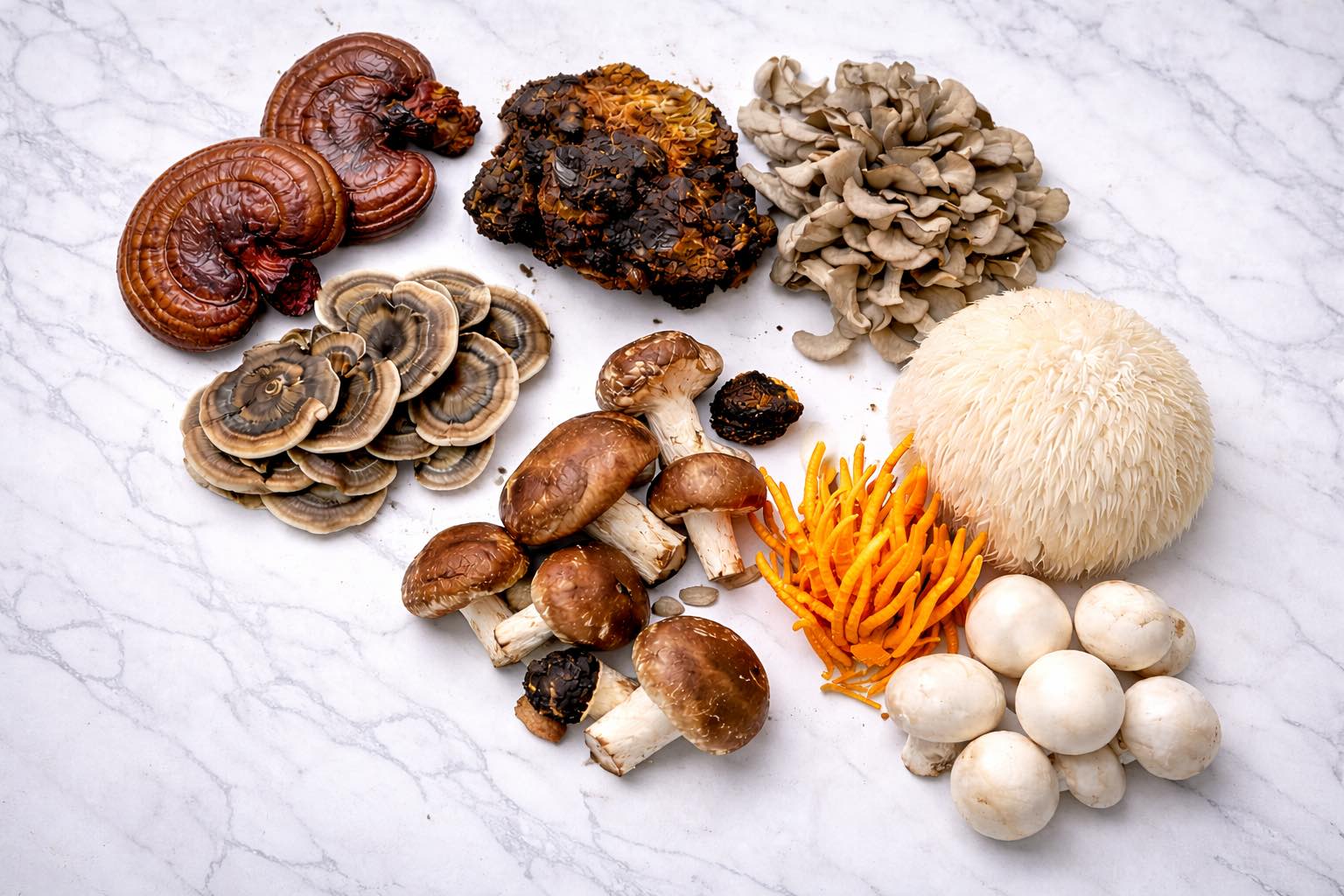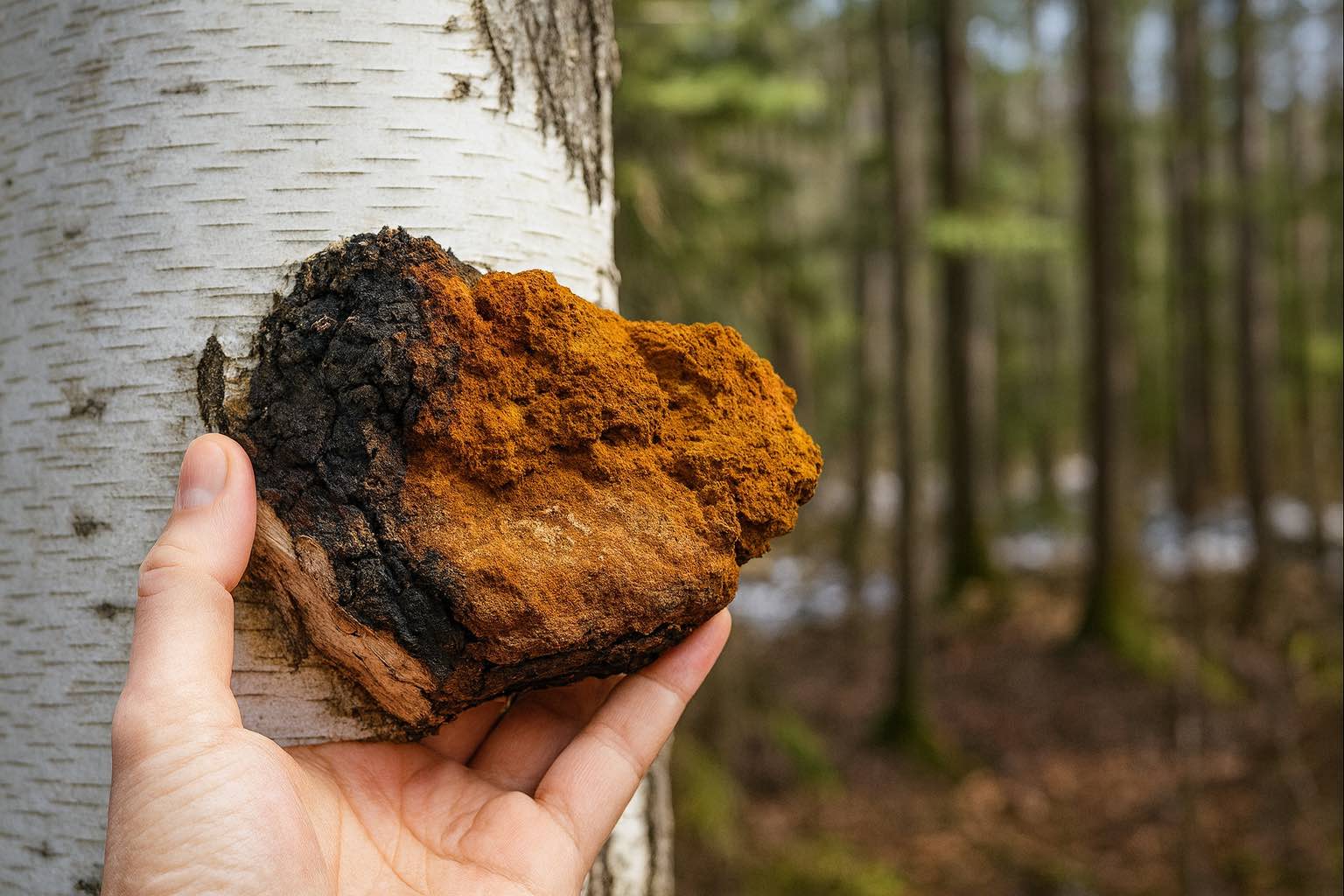THC and muscimol are psychoactive substances that can make people feel happy and relaxed. However, these two compounds differ significantly in their botanical origins (mushrooms vs. cannabis), how they achieve their effect, and their potential benefits.
This article explores muscimol vs THC, discussing their mechanisms of action, subjective effects based on dosage, potential risks, therapeutic benefits, and why potency testing is critical for muscimol and THC products.
Muscimol vs. THC Molecular Structure and Mechanisms
Muscimol and THC both affect the nervous system, but they interact with different parts to produce their respective psychoactive effects.
Muscimol: How It Works
Muscimol is a principal psychoactive compound in Amanita muscaria and related mushroom species. It contributes to Amanita’s psychoactive effects by interacting with GABA receptors and increasing their concentration throughout multiple brain regions.
- GABA is a neurotransmitter that maintains a balanced central nervous system by inhibiting overstimulation that can lead to anxiety, restlessness, and excessive rumination
- By increasing GABA levels, muscimol reduces the transmission of neuronal signals (glutamate) that cause overstimulation.
- As a result, muscimol helps GABA depress the central nervous system to induce relaxation, sedation, and altered states of consciousness at certain doses.
THC: How It Works
THC is a cannabinoid, a compound derived from cannabis that interacts directly with the body’s endocannabinoid system (ECS), a pervasive and critical system of neurotransmitters that affects behavior, mood, coordination, pain, sleep, and more.
- When THC molecules pass through the blood-brain barrier, their shape binds perfectly with CB1 and CB2 receptors in the ECS, which play signaling roles in the central nervous system.
THC interaction with CB1 and CB2 receptors in the ECS triggers nerve impulses in the brain that both stimulate and suppress the production of specific brain chemicals, such as:
- Increases dopamine, the body’s “feel-good” chemical that boosts mood, motivation, and attention.
- Stimulates ghrelin production, a chemical that acts on the appetite centers.
- Increases adenosine levels and suppresses the brain’s arousal system.
Simplify Your Path to Innovation
Test raw materials and finished goods for potency, purity, and safety—all in one place with ACS Laboratory.
Start Your Full-Panel Test
Subjective Effects of Muscimol vs. THC
Muscimol and THC can both produce euphoric, calming, and sedative effects. Muscimol leans toward physical relaxation and a “dream-like” state, while THC can be excitatory, such as making people more talkative and uninhibited.
Muscimol effects
As a GABA agonist, muscimol is similar to a muscle relaxant. Some people compare muscimol to mild alcohol intoxication or an indica cannabis strain. Falling asleep is common, and so are vivid dreams. Many people who consume Amanita muscaria mushrooms containing muscimol experience intense visions and insights during sleep.
Muscimol’s subjective effects include:
- Physical relaxation
- Euphoria
- Warm body sensations
- Analgesia (pain relief)
- A sense of peace and sleepiness
- A dream-like or lucid state of mind (at high doses)
THC effects
THC effects can vary dramatically among different people. Most of the time, THC alters activity related to awareness, anxiety, and impulse control, such as lowering motor skills and inhibitions while increasing feelings of happiness and calmness. THC also has sedative, pain-relieving, and sleep-promoting effects. However, it typically does not induce hallucinations.
Common THC effects include:
- Euphoria and elation
- Talkativeness and laughter
- Relaxation
- Increased appetite
- Pain relief
- Heightened senses (e.g., brighter colors and louder sounds)
- Distorted perception of time
THC vs Muscimol: Dose-dependent differences in effects
THC and muscimol’s similarities start to fade with increasing doses. Higher THC doses typically amplify the euphoria and sedation without visual hallucinations but can also increase anxiety and paranoia. Elevated muscimol doses produce powerfully dissociative, trippy effects that reliably yield lucid dreams and potential hallucinations.
Muscimol doses
Many experts say muscimol doses of 10-15 mg are enough to feel psychoactive effects. Consumers should keep the dose smaller to focus on relaxation and pain relief.
THC doses
THC’s medicinal psychoactive effects appear around 5 mg. Experts recommend starting lower and increasing THC doses slowly. For edibles, this can look like 2.5 mg or less of THC.
THC vs Muscimol Therapeutic Benefits and Research
THC and muscimol share potential benefits for sleep and anxiety. However, their benefits also differ, with THC showing evidence for managing chronic pain, nausea, and appetite stimulation, while muscimol shows promise in anti-inflammatory effects and supporting brain health.
Muscimol health benefits
Muscimol in Amanita mushrooms has been used medicinally for centuries, dating back to spiritual rituals in northern Europe and Asia. Modern medical trials and studies on muscimol are in the early stages, yet they show that this compound may influence issues like sleep, insomnia, brain health, anxiety, and pain.
- Sleep: In a mice study, muscimol dose-dependently increased the amount of sleep in both non-rapid eye movement (NREM) and REM stages.
- Inflammation: A 2022 animal study showed muscimol could protect against systemic inflammatory responses, highlighting the compound's potential anti-inflammatory effects.
- Memory: Muscimol could benefit brain health by treating symptoms associated with Huntington's disease and Alzheimer's.
- Anxiety: A 2024 study found a synergistic relationship between muscimol and reduced anxiety and depression behaviors in male mice.
Initial studies are promising but indicate the need for further research into muscimol’s safety profile and sedative properties, with potential benefits for sleep, depression, and pain.
THC health benefits
Delta-9 THC has been studied extensively for nearly 60 years. While research is still ongoing, many studies support its ability to treat various health problems, especially in areas of pain management and cancer symptoms. It also shows promise in areas that cross over with muscimol, such as sleep and anxiety.
- Nausea and vomiting: The most well-documented and common use for THC is relieving nausea and vomiting, such as those caused by chemotherapy for cancer.
- Appetite: THC can stimulate appetite, which is valuable in managing weight loss in HIV/AIDS and cancer patients.
- Mood and anxiety: THC stimulates the release of a neurotransmitter called dopamine, the brain’s “feel-good” chemical, which can reduce feelings of anxiety, stress, and irritability. Studies on THC also show increased feelings of relaxation among daily users.
Potential Risks and Side Effects from Muscimol vs THC
Muscimol and THC are both relatively safe and well-tolerated, but can cause issues depending on the dose, frequency of use, and consumption method. Muscimol can cause nausea, fatigue, confusion, and uncomfortable hallucinations. THC can cause anxiety, paranoia, nausea, and impaired cognitive function.
Muscimol side effects
Pure muscimol extracts are typically safe, therapeutic, and enjoyable at low to moderate doses. However, muscimol can pose toxicity and gastrointestinal issues depending on the dose and product. For instance, fresh Amanita mushrooms with muscimol contain ibotenic acid, a prodrug to muscimol, and a potent neurotoxin. Whole Amanita mushrooms or extracts with high ibotenic acid levels can cause adverse effects, such as:
- Sweating
- Nausea
- Cramps
- Loss of balance
- Involuntary bodily movements
Additionally, pure muscimol at high volumes can cause unwanted effects like:
- Headache
- Nausea and vomiting
- Fatigue
- Dizziness
- Confusion
- Hallucinations
- Restlessness
- Coma
THC side effects
THC is relatively low risk when used in low to moderate doses and infrequently. However, people report unwanted side effects, such as:
- Dry mouth and eyes
- Impaired memory and cognitive function
- Anxiety, panic, or paranoia
- High blood pressure
- Increased heart rate
- Nausea and vomiting
- Rarely, psychotic symptoms, like hallucinations and delusions
Regular or heavy use can result in tolerance and dependence. Additionally, excessive use over long periods can lead to an uncommon condition called cannabinoid hyperemesis syndrome (CHS). CHS induces severe recurrent nausea, vomiting, and abdominal pain.
Why is Muscimol and THC Potency Testing Essential?
Potency testing for muscimol and THC ensures product safety, consistency, and efficacy. Accurate potency testing guarantees that customers receive reliable dosages for their intended effects, minimizing the risk of adverse outcomes, such as toxicity from improperly processed muscimol or excessive THC, leading to anxiety or paranoia. This transparency builds trust, complies with regulations, and enhances brand reputation in competitive markets for psychoactive products.
Contact ACS Laboratory today to ensure your muscimol and THC products are backed by the accuracy, safety, and trust.









.png)




.png)
.png)
.png)
.png)